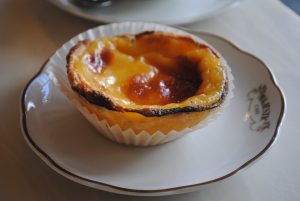Hi! I’m Alice, a third year student studying French and Portuguese and I’ve just returned from Lisbon, Portugal. After studying at a university in Lausanne for the first half of my year abroad, I spent 4 months doing a language course in Lisbon and it was a really good, though at times challenging, experience. Now that my year abroad is over, I’ve had time to reflect on my experiences in different countries and think about what I would do differently if I were to do it again.

As I enrolled as a student at the Université de Lausanne for the first part of my year abroad, I wanted to try something different whilst in Lisbon. A language course at the Universidade de Lisboa with the Instituto de Cultura e Língua Portuguesa seemed like a good option as I had already completed a month-long course with the same language school a few years ago, and so I knew the general structure of their courses. However, I made my decision quite late as I had been considering different options as well as different Portuguese cities; this made it a little stressful, especially in terms of finding accommodation at quite late notice, but I’ve also realised that it’s quite common for year abroad students not to have concrete plans for the whole year at the beginning and for plans to change.
I’m really pleased with my decision to go to Lisbon because, although I was apprehensive about living in a much bigger city than I am used to and my concern about Lisbon being overrun with tourists, I ended up enjoying exploring different parts of the city and finding some really nice spots.

My accommodation was in quite a central location and I used the metro every day to get to and from my language classes, so I decided to get a ‘navegante’ travel card which was a little time-consuming to get initially but was definitely worth the hassle; this is a rechargeable card that works on the metro, buses, trams and ferries, and most locals have one. This meant that I paid a monthly amount and then had access to all areas of metropolitan Lisbon, and so I made the most of this by visiting different parts of the city. As well as visiting some of the main tourist hotspots (such as the Sé cathedral and the nearby town of Sintra), I also found some hidden gems around the city. For example, my favourite place to visit was the Gulbenkian, a series of museums situated in a park with lots of wildlife and quite near to my accommodation, so it was a lovely place to go for a walk. I also really enjoyed exploring the museums in Lisbon – on the first Sunday of every month several museums offer free entry between certain hours, including the MAAT museum. I also particularly enjoyed visiting the Museu Nacional do Azulejo, and the Mosteiro de São Vicente de Fora.
I had the afternoons and weekends free to explore the city and beyond, and on weekday mornings I studied for 4 hours at the language school. I found it helpful that the classes focused on a variety of topics, so we not only had grammar and writing lessons but also Portuguese history classes, Portuguese art and culture classes, and literary reading lessons. I found this to be a good structure as we studied aspects of Portuguese culture that I hadn’t explored before. Whilst I would have preferred more dedicated speaking classes, my spoken Portuguese still improved over the 4 months as we did several presentations in class, and I got to know my course mates.

Whilst I was initially concerned that I might speak English with my fellow students, in fact we spoke Portuguese together in and outside of classes, as our common language was Portuguese. This helped improve my language skills further and I also became friends with a few of them, meeting up outside of classes for coffee and also to go to the theatre. It was really fun going to see a Portuguese theatre production even though it was tricky to understand everything the actors were saying. However, it was a valuable experience and listening to Portuguese in a different setting was useful because I was still able to follow the plot.

I really enjoyed both parts of my year abroad and studying at university and doing a language course were positive experiences; I was able to improve my language skills and form new friendships in both cities, gaining confidence over the year and going further out of my comfort zone. There were of course challenges involved in the year abroad, but I really value the experiences I had and finding solutions made me feel more confident in exploring new places.


